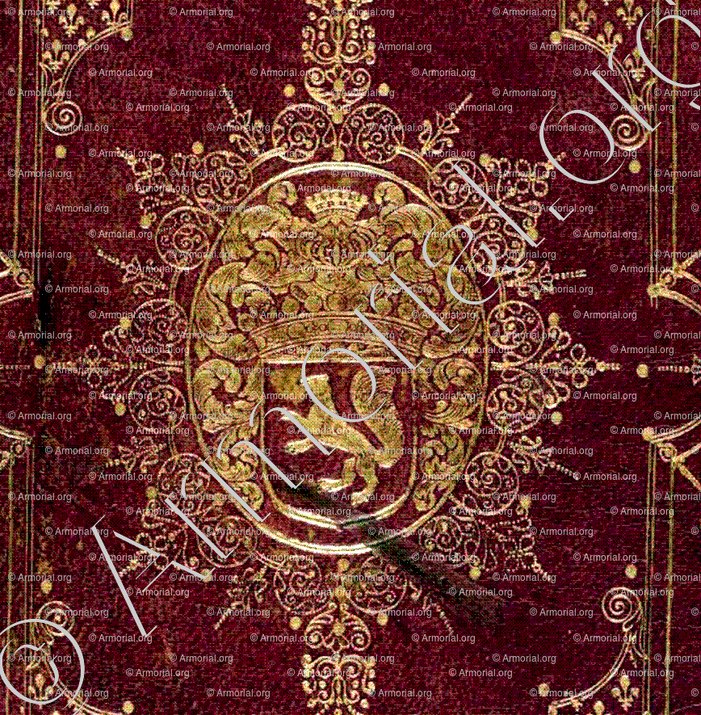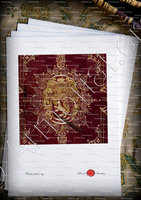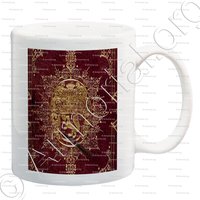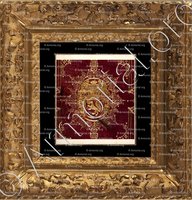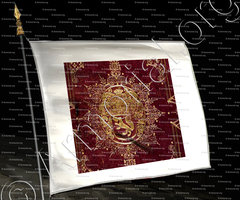DESCRIPTION
FOUQUET
Paris
France
Armoiries:
" D'argent à l'écureuil rampant de gueules. "
Le mot « FOUQUET » désignant un écureuil en langue angevine, les FOUQUET portaient les armes d'argent à l'écureuil rampant de gueules avec la devise « Quo non ascendet ? » (« Jusqu'où ne montera-t-il pas ? ») qui était peut-être celle de la famille en général, mais en tout cas celle qui fut adoptée par Nicolas FOUQUET.
Nicolas FOUQUET
Nicolas FOUQUET, marquis de Belle-Île, vicomte de Melun et de Vaux, né le 27 janvier 1615 à Paris et mort le 23 mars 1680 à Pignerol, est un homme d'État français. Procureur général au Parlement de Paris et surintendant des Finances en 1653, il devient, en puisant dans les comptes publics, l'un des hommes les plus riches et les plus puissants du royaume de France.
Acquéreur de nombreuses terres et propriétés, il fait bâtir entre 1657 et 1661 le château de Vaux-le-Vicomte, qu'il transforme en un domaine fastueux, grâce aux artistes de renom qu’il embauche, ce qui contribue à alimenter la désaffection du jeune roi Louis XIV.
L'influence grandissante de Jean-Baptiste Colbert marque l'arrêt progressif de l'ascension de FOUQUET, qui est dénoncé par Colbert pour malversations.
Destitué et arrêté sur l'ordre de Louis XIV en 1661, il est condamné au terme d'un procès-fleuve de trois ans à la confiscation de ses biens, et au bannissement hors du royaume. Sa peine est aggravée par le roi en un emprisonnement à vie en la forteresse de Pignerol, où il meurt le 23 mars 1680.
Nicolas FOUQUET retrouve une célébrité posthume par le biais des nombreux romans et films, notamment Le Vicomte de Bragelonne d'Alexandre Dumas.
Nicolas FOUQUET est issu d'une famille d'origine angevine, qui fit fortune dans le commerce du drap avant de se convertir dans la magistrature et qui, contrairement aux prétentions de l'époque du clan FOUQUET, n'était pas d'origine noble mais appartenait encore au xvie siècle à la bourgeoisie marchande : le premier ancêtre connu Jehan FOUQUET était installé comme drapier-chaussier près d'Angers à la fin du xve siècle.
Le mot « FOUQUET » désignant un écureuil en langue angevine, les FOUQUET portaient les armes d'argent à l'écureuil rampant de gueules avec la devise « Quo non ascendet ? » (« Jusqu'où ne montera-t-il pas ? ») qui était peut-être celle de la famille en général, mais en tout cas celle qui fut adoptée par Nicolas FOUQUET.
Né le 27 janvier 1615 à Paris, il est le second fils de François IV FOUQUET (alors maître des requêtes de l'hôtel du roi) et de Marie de Maupeou, issue d'une famille influente de la noblesse de robe.
En 1626, à la demande expresse du cardinal de Richelieu, François FOUQUET est nommé juge du tribunal d'exception qui condamne à mort le comte de Chalais pour crime de lèse-majesté. Il se fait remarquer à cette occasion par Richelieu qui lui confie ensuite plusieurs missions et gagne auprès du cardinal un crédit, qui dès lors assure au clan FOUQUET la protection de Richelieu.
Les FOUQUET sont un modèle de famille catholique dévote et, comme les Maupeou, ils forment « une famille exemplaire de la Contre-Réforme ». Sur les douze enfants survivants du couple, les six filles et trois des garçons seront religieux (deux d'entre eux deviendront évêques). Nicolas FOUQUET fait ses études chez les jésuites au collège de Clermont (futur lycée Louis-le-Grand) à Paris. Il semble alors s'orienter lui aussi vers l'état ecclésiastique : il reçoit la tonsure en janvier 1635, devient trésorier de l'abbaye Saint-Martin de Tours et reçoit le bénéfice du prieuré de Saint-Julien de Douy ; mais il s'oriente finalement vers une licence en droit à la Sorbonne , qu'il obtient en 1631 à l'âge de seize ans. Il est reçu avocat au Parlement de Paris en 1632.
Nicolas FOUQUET épouse en 1640 à Nantes Louise Fourché, fille d'un conseiller au parlement de Rennes, qui lui apporte en dot 160 000 livres en argent et rentes sur particuliers plus la terre de Quéhillac. Six mois après avoir donné naissance à une fille, Marie, Louise meurt à l'âge de 21 ans en août 164112. À 36 ans, il contracte un second mariage en février 1651 avec Marie-Madeleine de Castille, âgée de 15 ans, qui appartient elle aussi, par son père, à une famille de marchands passée à la finance, puis anoblie, et qui apporte à FOUQUET le vaste cercle de relations de la famille de sa mère dans la haute robe parisienne.
Sources:
Wikipédia
________________________________________________________
FOUQUET
Paris
France
Coat of Arms:
"Argent with a red squirrel rampant."
The word "FOUQUET," meaning squirrel in the Angevin language, led the FOUQUET family to bear the arms argent with a red squirrel rampant and the motto "Quo non ascendet?" ("To what heights will he not climb?"), which might have been the family motto in general but was certainly adopted by Nicolas FOUQUET.
Nicolas FOUQUET
Nicolas FOUQUET, Marquis of Belle-Île, Viscount of Melun and Vaux, was born on January 27, 1615, in Paris and died on March 23, 1680, in Pignerol. He was a French statesman. As the Attorney General in the Parliament of Paris and Superintendent of Finances in 1653, he became one of the richest and most powerful men in the Kingdom of France by drawing from public funds.
An acquirer of numerous lands and properties, he built the Château de Vaux-le-Vicomte between 1657 and 1661, transforming it into a lavish estate with the help of renowned artists, which contributed to the disaffection of the young King Louis XIV. The rising influence of Jean-Baptiste Colbert marked the gradual end of FOUQUET's ascent, as he was accused of embezzlement by Colbert.
Dismissed and arrested by order of Louis XIV in 1661, he was sentenced after a three-year trial to the confiscation of his assets and banishment from the kingdom. His sentence was intensified by the king to life imprisonment in the fortress of Pignerol, where he died on March 23, 1680.
Nicolas FOUQUET gained posthumous fame through numerous novels and films, notably "The Vicomte of Bragelonne" by Alexandre Dumas.
Nicolas FOUQUET came from a family of Angevin origin that made its fortune in the cloth trade before moving into the judiciary. Contrary to the claims of the FOUQUET clan at the time, they were not of noble origin but still belonged to the bourgeoisie in the 16th century. The first known ancestor, Jehan FOUQUET, was a draper-shoemaker near Angers at the end of the 15th century.
The word "FOUQUET," meaning squirrel in the Angevin language, led the FOUQUET family to bear the arms argent with a red squirrel rampant and the motto "Quo non ascendet?" ("To what heights will he not climb?"), which might have been the family motto in general but was certainly adopted by Nicolas FOUQUET. Born on January 27, 1615, in Paris, he was the second son of François IV FOUQUET (then a master of requests for the king's household) and Marie de Maupeou, from an influential family of the judiciary nobility.
In 1626, at the express request of Cardinal Richelieu, François FOUQUET was appointed judge of the exceptional court that sentenced the Count of Chalais to death for treason. He caught Richelieu's attention during this occasion, earning several missions from the cardinal and gaining credit that ensured the FOUQUET family's protection by Richelieu.
The FOUQUETs were a model Catholic devout family and, like the Maupeou family, they were "an exemplary family of the Counter-Reformation." Of the couple's twelve surviving children, six daughters and three sons became religious (two of whom became bishops). Nicolas FOUQUET studied with the Jesuits at the Collège de Clermont (now Lycée Louis-le-Grand) in Paris. He seemed initially inclined towards the clergy, receiving the tonsure in January 1635, becoming treasurer of the Abbey of Saint-Martin de Tours, and receiving the benefit of the Priory of Saint-Julien de Douy. However, he eventually pursued a law degree at the Sorbonne, which he obtained in 1631 at the age of sixteen. He was admitted as a lawyer to the Parliament of Paris in 1632.
Nicolas FOUQUET married Louise Fourché in Nantes in 1640. She was the daughter of a counselor in the Parliament of Rennes and brought a dowry of 160,000 livres in cash and rents, plus the land of Quéhillac. Six months after giving birth to a daughter, Marie, Louise died at the age of 21 in August 1641. At 36, he married Marie-Madeleine de Castille in February 1651. She was 15 years old and belonged, through her father, to a merchant family that had moved into finance and then been ennobled. She brought FOUQUET the extensive network of her mother's family in the high judiciary of Paris.
Sources:
Wikipedia
PARTAGEZ SUR LES RÉSEAUX SOCIAUX
LES AVIS
Il n'y a aucune note pour le moment. Soyez le premier à évaluer !
DONNEZ UNE NOTE




